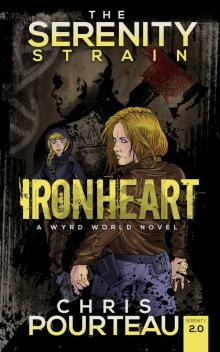- Home
- Chris Pourteau
Stormbreak (The Serenity Strain Book 1) Page 8
Stormbreak (The Serenity Strain Book 1) Read online
Page 8
They’d been doing it for hours, competing with one another as they sat in weary tedium. Stavros had begun to regret staying in Huntsville instead of returning to Austin after his meeting with Marsten Thursday. He could’ve made it back there by dark and avoided the weather and Parker altogether. Instead, something had nagged at him and kept him here. Parker’s insinuations and taunting. Marsten’s odd, out-of-the-box behavior, and the need to know what that was all about.
Well, now he knew. Parker, goddamn him, was right. Serenity was a failure.
“Don’t think like that,” he whispered to the walls around him, something he did when no one else was around. When he needed to hear words in the sound of his own voice, not merely think them. “Phase One trials always have hiccups. That’s why they exist. They’re part of the empirical process, of determining how next to proceed toward ultimate success.”
He sat back in his chair, put his feet up on a 1970s Steelcase desk and tried to relax. “And, really, when you think about it, it wasn’t a failure at all. We introduced new genes into the human brain, and they changed behavior. For the first time in human history! We’ve directly connected personality formation with genetic determinism. After the weather clears, we’ll observe, record the data, and figure out what went wrong. Simple as that.”
For reassurance, the scientist repeated it in his head.
Simple as that.
But his analysis would have to wait for the weather to pass. His team hadn’t made it from Austin in time to enter the prison before Parker locked it down. Or maybe they hadn’t made it in time on purpose.
Can’t really blame them, he thought. Who the hell wants to be stuck in the state prison during a hurricane?
The light above him flickered. The wicked thought passed through his mind that maybe someone was getting juiced in the Death House. Then he remembered they didn’t use Old Sparky anymore. Now they just stuck a needle in your arm like they were putting a dog to sleep. And they didn’t even care if it broke off. I mean, what the hell would be the difference, anyway?
Thinking of a broken needle reminded him of the struggle to sedate Marsten. He wondered what the inmate’s condition was. The medical team, escorted by three guards, had examined him four times since the incident on the gurney. Each time he’d remained unconscious. Each time they’d reduced the Lorazepam-Haldol cocktail a bit, trying to get him to wake up. They needed to determine if he was still psychotic or if the episode had been a singular event. As far as Stavros knew, Marsten was still dead to the world. It’d been hours since they’d last checked on him. The prison staff was reduced to necessary personnel only prior to the lockdown. Most of the nonessential staff were at home now with their families.
Thunder grumbled and rain slashed the roof. The light over his head sputtered again. Finally it came back strong, but now he heard a low fizzing noise accompanying the glow. It sounded like one of those radios from the 1940s when first turned on. Like the tubes were heating up and popping dust off their glass casings. An electrical vibration so fast it sounded like a small hummingbird hovering in a box.
Stavros closed his eyes and leaned back in his chair, which creaked under his weight. This was not the end of his career. Oh, no doubt, there’d be a lot of backpedaling on the university’s part. The seed money from the state technology fund might dry up. He might even lose his endowed chair. Tenure was safe, at least.
All of that depended on how much the university backed him up and how much trouble Parker made for him. It’s not like the prisoners would do much talking; and even if they did, a few bleeding-heart protesters outside the walls for a day or two would likely be the worst that would come of that. Hell, this was Texas, not California.
“This is salvageable,” he said, patting his thigh. “It’s definitely salvageable.”
The bulb overhead glowed brighter. The wings of the hummingbird beat harder. Stavros peered up at the light until his eyes hurt. It flashed white-hot and he’d barely thrown his arms over his head when it burst, sparks flying. He fell backward in the chair, cracking the back of his head on the wall behind him. The office echoed with the crash of metal on tile, bone on plaster. Cursing, Stavros maneuvered to his knees, pushing the chair angrily out of his way.
The klaxons sounded. Everything was suddenly bathed in red light. Stavros went stock-still. The prisoners down the hall hooted like monkeys at the zoo, mocking the alarm. Helen answered, cracking the clouds and whipping the outside walls with a cat-o’-nine-tails barbed with bullets of rain. It all sounded eerily demonic to the scientist’s ears. As though a troupe of carnies had come inside and unleashed mayhem in the asylum.
Still on the floor, he backed under the comforting weight of the Steelcase desk and pulled the chair in behind him as a kind of barrier protecting his makeshift castle. He drew his knees up, closed his eyes, and listened to the hooting, howling madmen in their cells as they worshipped at Helen’s altar of destruction.
Part 2
Human Trials
Chapter 8. Saturday, early morning.
The prison was locked down for the storm, which had mostly passed on. She knew they were only running a skeleton crew. Mostly people that didn’t have families to go home to anyway. Like her. No family. No obligations.
Maggie Spinks lay on her bunk in the isolation cell, something buzzing in her head. A symptom of Stavros’ virus doing its thing, maybe. That’s what Marsten had told her, anyway. But it was annoying, like tinnitus of the brain, as constant and unavoidable as the voices in her head. Now they all spoke with a buzz behind them, as if they’d all spontaneously developed a smoker’s disease. A wheezing undercurrent beneath their words.
To take her mind off it, she stared at the red glow of the emergency lights beyond the bars of her cell. Blinking on and off, a red alert without sound. A cape waving in front of a thousand bulls behind bars. She knew sunrise couldn’t be far off. At least the goddamned alarm had stopped. That’s what woke her from a deep sleep in the first place. The whoop-whoop-whoop of the prison alarm. Something was up somewhere.
Now, mercifully, the only sign of a prison-wide crisis was the flash on, flash off of the red lights. With the storm’s passing and the hooting and hollering of her fellow inmates finally subsiding into sleepy snores, Maggie’s hearing got sharper. It was something you developed in jail. Listening for the next shank being slipped out of its hiding place around the corner. Picking out gossip two tables away at chow that mentioned you by name. Guards promising cigarettes for a blowjob on the next night shift. Your ears got sharp in prison. Especially if you were a woman.
So her ears pricked up the moment the footsteps entered the isolation wing. The twist of the door’s handle, its creaking on the hinges. Probably a guard making rounds. A preview of how prison life would be getting back to its day in, day out banality soon enough. The storms would be gone, the staff would be back. Reading and eating would once again become the high points of her days.
Worth it, she thought. Worth getting rid of those little bastards. Now I got nothing but time for myself.
The footsteps were nearer. Slow and precise. A tread she didn’t recognize, and she knew all the guards by their footfalls on the ward. The clickers, the clompers, the toe-steppers, the flat-footed. But this one she didn’t recognize.
A shadow fell across her cell door, the red light fetching it into and out of existence like a strobe light. Maggie tried to listen even more closely, but that damned buzzing inside her head made that impossible.
“Hello, Maggie Mae.”
She furrowed her forehead. That was the last voice she’d expected to hear.
“Peter?”
Marsten stood in front of the cell door, rubbing his right wrist.
“Maggs.”
She sat up on her bunk and aimed her left ear at the floor. Shut up for once, she ordered the voices in her head clamoring for action. Shut up and I’ll find out.
“What the hell are you doing, Peter? You on laundry detail or something?�
�
Marsten laughed.
“No, not you,” Maggie said, answering her own question. “They’d never let you be a trusty. So what the hell is going on?”
Marsten smiled. “I’m getting the band back together.”
Lightning flashed, barely visible in the high windows lining the corridor outside her cell. She saw him turn his eyes up for a few seconds. Looked like he was counting. Thunder grumbled lazily.
“You’re … where are the guards?”
“Franklin. Smack. Juggs. Simpson,” he recited, ignoring her question. “You’re my last stop.”
Marsten pulled a set of keys out of his pocket and inserted one into Maggie’s cell door.
Her body tingled with excitement. Marsten’s manner, his unhurried demeanor, the smooth, calm way he talked. She was staring at what she knew to be the cause of the alarm’s whooping earlier. Something big was happening all right. Something very big. And here was Mr. Big himself, asking her to join the party. As the tumblers of the lock turned, a part of her—a very small part, the part that had been merciful and insisted she roll down the windows to speed her sleeping children’s drowning—argued for her to stay put.
No jail break on this scale had ever been successful. She registered that fact in half a second in her head.
Then she leapt from her bunk as Marsten swung the door inward. She ran to him, put her arms around his bull neck and pulled his mouth to hers. It was wet and tasted of sleep and copper, with a strange chemical undercurrent.
“Where’ve you put this mouth, Peter?” she breathed, her breasts mashed against his massive chest.
“Most recently? Around Senior Corrections Officer Bradford’s jugular vein. Should I have swished with something?”
In answer, she pulled him to her again and shot her tongue into his mouth.
* * *
Megan was sleeping on Mark’s couch, Jasper snoozing lazily on the floor beside her. Lauryn looked at her daughter in the candlelight, curled up beneath a shawl, her mouth barely open as she snored lightly through her nose. It was a portrait Lauryn had first seen many years before Megan was born.
It had been in college, during late-night study sessions when she and Mark would crash on the benches in the student center, too exhausted to stumble to their dorms. She still remembered the first time Mark fell asleep with his head on her lap. They’d only been friends then, study partners, and it was boredom with studying basic chemistry that forced them from the table with its books askew to find the comfortable cowhide of a student center bench.
God, students can sleep anywhere, Lauryn marveled at the memory. She hadn’t made the connection until just now, but as she watched Megan mirror her father’s sleeping habits, she grinned at the idea that a mutual disdain for chemistry had, in fact, catalyzed a romantic reaction between the two of them. As Mark had lounged there snoozing, mouth ajar and barely snuffling when he breathed, as she’d stroked his dark hair and struggled to hold her breath during his sleeping pizza farts, she’d thought even then there might be more between them. Remembering that time made her smile, especially when she considered the outrageous idea of how the seeds of love had been planted while a gas cloud smelling vaguely of tomato sauce hung over them.
Then Lauryn realized she was smiling in the past, not living in the present, and sadly forced the expression away. She decided to focus on Megan, not Mark. But that was a task impossible in its own irony. Tilting her head slightly, she regarded the curves of her daughter’s face. She’d never really noticed before how much Megan looked like her father, a strange reality to admit to herself. The cheeks approaching a chipmunk plumpness. The slightly out-of-alignment nose. Probably where the snoring comes from, she reasoned. Genes make us who we are, right? Can definitely blame him for that one.
“Everything okay?”
She realized Mark had been watching her watch their daughter for the last few moments. She’d thought him asleep as well. The two of them, Mark and Megan, had always been able to sleep through anything, storm or dogs barking or anything else that made Lauryn shoot up straight awake in the middle of the night.
More genetic affinity, that.
Sometimes she wondered if Megan might be happier with Mark as the custodial parent. It wasn’t just their sleeping habits that were similar. Their personalities played off one another like a comedy team’s. So much so that Lauryn had often felt like an outsider when they’d lived under one roof, her only role being to laugh at their routines. At least that’s how it used to be. Now, everyone was just uncomfortable all the time, strained at being in the same room together, as if just returned from combat and jumping at every little noise.
This time, as she remembered Mark’s question from a moment before, Lauryn was able to abort a smile before it was ever born. “Yeah, fine. Just can’t sleep,” she said. “Did I wake you up?”
Mark blew out a breath and blinked lazily, laying his head back to stare at the stucco ceiling.
“No. That bitch Helen did.”
The constant hail of heavy rain receded momentarily beneath thunder booming outside.
“Sorry,” Mark said absently. “Have you slept at all?”
Lauryn curled up in the chair, wrapping her arms around her knees. “I think I dozed a little. Mostly I can’t sleep.”
“You must be exhausted.”
“Yeah, you know me. After a certain point, exhaustion just keeps me awake.”
He laughed lightly, a tired sound. “Yeah. I remember.”
“How much longer, do you think?” she asked, trying to change the subject. She made vague, swirling motions with her fingers.
Mark shrugged. He glanced at his dead cell phone, sitting useless on the coffee table. He’d love to talk to Frank for just ten seconds. Or Iris, for longer. He tried to keep that thought from his eyes as he said, “Let me try the radio.”
Reaching up to the shelf on the wall, he flipped on the iPod player, then changed the input to FM Radio. It might’ve been the first time he’d ever used that feature, he thought.
Nothing happened. He glanced at the power light, found it dark, and reached over and pulled at the device. Yep, still plugged into the wall.
“Power’s out, remember?” said Lauryn flatly.
“I do now.”
Mark got up and went to the kitchen, rummaged around in a drawer. Jasper followed him with his eyes but was too comfortable to lift his head. Mark brought back and installed two double-A batteries, hit the power button again, and set it back on the shelf. After some fuzzing, a booming voice made him reach up and turn the volume down a bit.
“Ladies and gentlemen of the Granite State, this is your friend Parker Warden,” said a man who sounded like he carried a cause in his gut. “I’ve been waiting and watching here at Yes Radio, call letters W-Y-R-D. And what I see is trouble. Trouble in every direction.”
Mark looked at Lauryn and shrugged. An update was an update.
“That’s weird,” said Lauryn as the radio voice prattled on. “Parker Warden. My warden in Huntsville is named Parker.”
Mark shrugged. “Things are weird all over.”
“There’s another dark age coming,” continued Warden, “and if we don’t do something to put a stop to it, everything you and I love about this once great nation is going to collapse.”
Mark rolled his eyes. “Oh, he’s one of those guys.”
“See if you can find a local station. That guy’s in New Hampshire, he said.”
Mark fiddled with the dial until he found some music. “That’s more like it. They’ll broadcast weather updates when they have something to say.”
James McMurtry’s “Hurricane Party” was fading out. The station had favored a playlist of bad-weather favorites for the last three days. Stevie Ray Vaughan was played at least once an hour.
Instead of a DJ taking up where McMurtry left off, three long, electronic monotones introduced a bulletin from the National Oceanic and Atmospheric Administration. A dispassionate, clipped, comput
erized voice began to recite the longest message in the NOAA’s history.
The National Weather Service has issued a Disaster Warning for the following counties: Austin, Brazoria, Brazos, Burleson, Chambers, Fort Bend, Galveston, Grimes, Hardin, Harris, Houston, Jefferson, Liberty, Madison, Montgomery, Polk, San Jacinto, Trinity, Walker, Waller, and Washington Counties.
Devastating damage from Hurricanes Glenn and Helen is expected to worsen as inland waterways, lakes, and creeks continue to overflow levees. Much of the lowland areas in these counties will continue to be inundated for weeks. Major structural damage of homes, apartment buildings, and other residential structures will make these buildings unsustainable and unsafe.
Most of the area will be uninhabitable for weeks, perhaps longer. At least one half of well-constructed homes are expected to have roof and wall failure, leaving those homes severely damaged or destroyed. The majority of industrial buildings will be non-functional for an unforeseen period of time. Partial to complete wall and roof failure of these structures is also expected. Most wood-framed, low-rising apartment buildings have been destroyed. Concrete-block low-rise apartments have sustained major damage … including some wall and roof failure. High-rise office and apartment buildings are swaying dangerously as Hurricane Helen continues tracking north through the region, a few to the point of total collapse.
Airborne debris is widespread and may include heavy items such as household appliances and even light vehicles. Sport utility vehicles and light trucks have been moved. The blown debris has created additional destruction. Power outages will last for weeks, as most power poles are down and transformers destroyed. Water shortages will make human suffering incredible by modern standards.
The vast majority of native trees have been snapped or uprooted. Only the heartiest remain standing but are totally defoliated. Few crops will remain. Livestock, pets and any persons left exposed to the winds should be considered lost.

 Masada's Gate
Masada's Gate Valhalla Station
Valhalla Station The Erkennen Job
The Erkennen Job Susquehanna
Susquehanna Columbia
Columbia Gettysburg: A Tale of the Second War for Pennsylvanian Independence
Gettysburg: A Tale of the Second War for Pennsylvanian Independence Tales of B-Company: The Complete Collection
Tales of B-Company: The Complete Collection Ironheart (The Serenity Strain Book 2)
Ironheart (The Serenity Strain Book 2) Stormbreak (The Serenity Strain Book 1)
Stormbreak (The Serenity Strain Book 1) Legacy Fleet: Avenger (Kindle Worlds) (The First Swarm War Book 2)
Legacy Fleet: Avenger (Kindle Worlds) (The First Swarm War Book 2) Shadows Burned In
Shadows Burned In